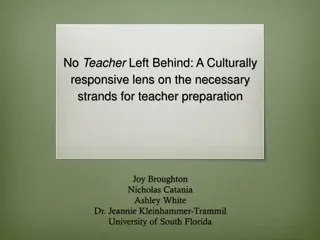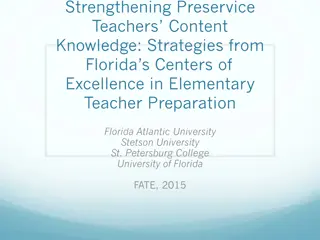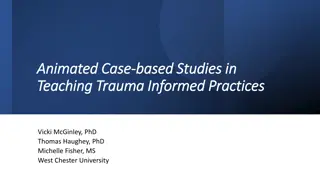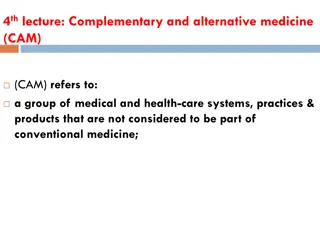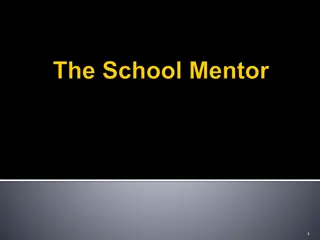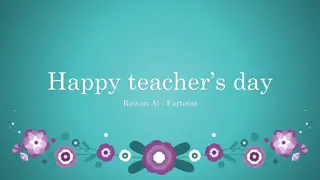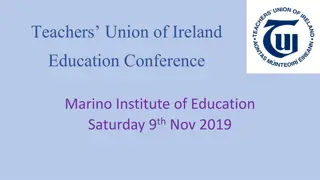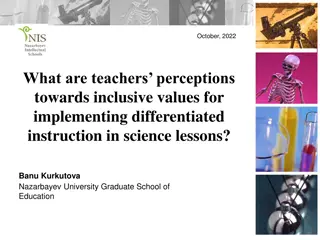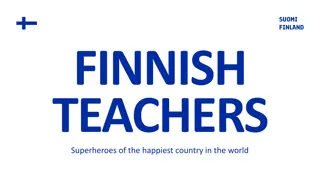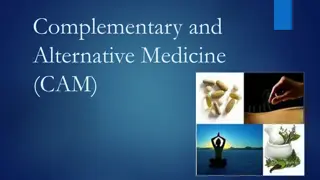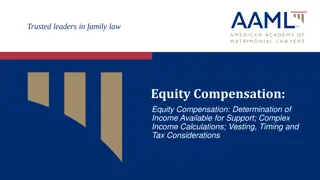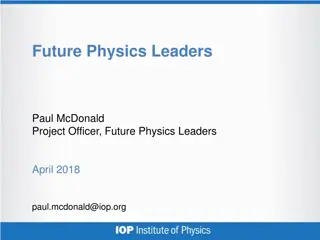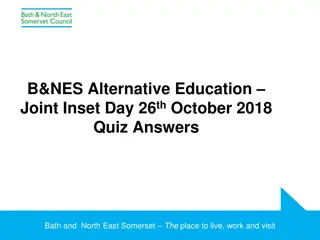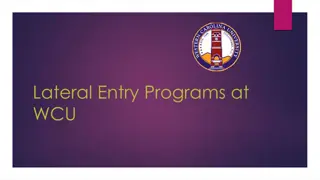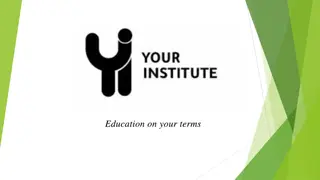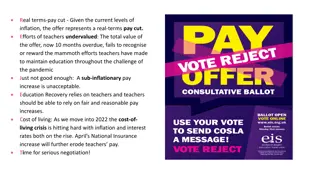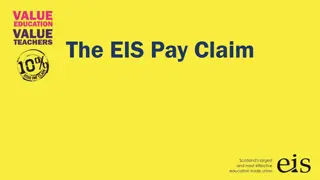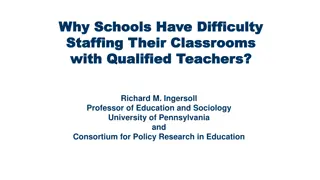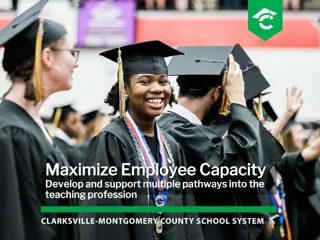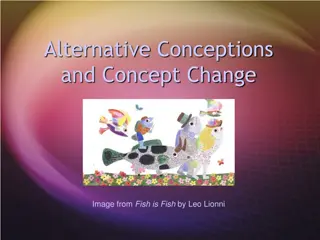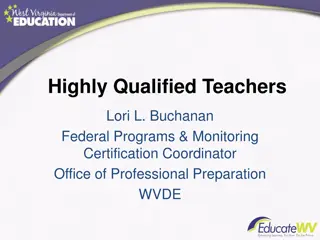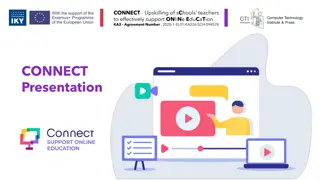Understanding Preservice Teachers in Alternative Education Settings
This qualitative report explores the experiences of preservice teachers in alternative education settings for students with emotional and behavioral challenges removed from their home schools. It addresses the teacher shortage and lack of preparation in AES, aiming to promote inclusive practices through qualitative research from a social justice perspective.
Download Presentation

Please find below an Image/Link to download the presentation.
The content on the website is provided AS IS for your information and personal use only. It may not be sold, licensed, or shared on other websites without obtaining consent from the author. Download presentation by click this link. If you encounter any issues during the download, it is possible that the publisher has removed the file from their server.
E N D
Presentation Transcript
Preservice Teachers in Alternative Education Settings: A Grounded Theory Approach to Understanding their Experiences Qualitative Report Annual Conference, 2021 Lesley N. Siegel, Ph.D., & Tina M. Valtierra, Ph.D.
Co-Authors & Research Partners Lesley Siegel, Ph.D. Assistant Professor West Chester University of PA College of Education & Social Work lsiegel@wcupa.edu Tina Valtierra, Ph.D. Assistant Professor Colorado College Department of Education kvaltierra@coloradocollege.edu Collaborations approach qualitative research from a social justice lens exploring the use of qualitative methods to promote teacher identity development, reflective practices, and inclusive practices for CLDE learners. Researching and writing together since 2015.
AES serve a growing number of most vulnerable and marginalized students. However, there remains a severe teacher shortage and teachers in AES are often unprepared to educate and support their students (Lewis et al., 2016; Mason-Willians & Gagnon, 2017). Alternative Education Settings & Teacher Preparation Undergraduate teacher preparation does not address specifically address alternative education settings (Ashcroft, 2010) and therefore perpetuates the cycle of new teachers unprepared to meet needs unique to students educated in AES (Mason- Willians & Gagnon, 2017). Current Study: investigating the learning experiences of preservice teachers in AES for students with emotional and behavioral challenges removed from home schools.
Literature Informed this Study: Alternative Education Settings: student outcomes, discipline, and enrollment Teaching in AES Transformational Learning Theory
AES: student enrollment, outcomes, & experiences Enrollment patterns for AES show disproportionate enrollment of students with IEPs, students of students of color, students who are economically disadvantaged, and male students (Afacan & Wilkerson, 2019; Carver & Lewis, 2010; Perzigian et al., 2017; Wilkerson et al., 2016). Consistent pattern of poor educational outcomes (including high dropout rates) compounded by a low return rate to a traditional school environment (Carver et al., 2010; Kenney-Lewis et al. 2016) at which point research shows they are at both academic and social disadvantage (McNulty & Roseboro, 2009)
Teaching in AES Less than one third of alternative settings had strict teacher certification requirements (Lewis et al., 2016). Mason-Willians and Gagnon (2017) report that 25%-35% of special education teachers teaching in alternative settings did not hold certification in special education. Teachers self-report being unprepared to work in AES (Free, 2017; Hoge & Rubinstein-Avila, 2014) There is a severe teacher shortage in AES running parallel to an increase in student enrollment (Mason-Williams & Gagnon, 2017)
Transformational Learning Theory Disrupt frames of reference (p. 6) and provide experiences that, coupled with guided instruction and reflection, lead to transformation of thinking (Mezirow, 1997) Providing learning experience that is purposefully disorientating can lead to changes in a student s frame of reference and worldview (Freed et al., 2019)
Methodology Grounded theory approach informed by Charmaz s writing on constructivist grounded theory (2014, 2017) and utilizing Strauss & Corbin s work (1994) on constant comparison to examine ways in which field experiences in Alternative Education Settings impact teacher candidates. Research questions guiding our study: How do teacher candidates perceptions of AES for students with behavioral challenges shift during a fieldwork placement?
Study Context: undergraduate teacher certification course at public university in SE Pennsylvania teacher candidates completed fieldwork at AES for one morning week, duration of semester In this study, AES in SE PA: AES work with students with behavioral challenges, high percentage students with IEPs. Ages 4-21, both day and residential Study three consecutive semesters: fall 2018, spring 2019, fall 2019
Data Sources: teacher candidates weekly journals during AES field placement scanned and transcribed to facilitate analysis Data Analysis: concurrent with data collection utilizing Constant Comparison (Charmaz, 2014; Strauss & Corbin, 1994) each author independently analyzed each semester s data using line-by-line coding and memoing jointly engaged in focused coding Theoretical saturation was determined after the third cycle Engaged in axial coding across each semester to guide the development of categories and inform theory development
Overwhelmingly, the experiences, students, and structures of the alternative education settings the teacher candidates were placed in felt completely foreign to the teacher candidates, all other . The findings that emerged from this study were consistent across semesters, which aided in theory development. Findings Findings organized in four themes: Expectations, Teaching & Learning in AES, Responding Emotionally, Special Educator as Martyr
Expectations Fear Gives Way to Familiarity "I haven t really noticed anything different in the classroom from other [classrooms]" (TC 1, F 19). Ignorance, Uncertainty, Surprise Going into this field placement, I honestly did not know what to expect. I quickly realized that they students were not only teenagers but most were much larger than me. The halls seemed jail-like. The high school students remained in the same room, with no windows, for all academic instruction/periods. (TC 12, F 19).
Teaching & Learning in AES Academics as an Afterthought What concerned me the most was about the teaching. In the morning class that I observed, the students rarely did any academic work. (TC 8, S 19). Academics & Lesson Plans come 2nd (or 4th) "They didn t need to teach lessons to be teachers (TC 5, F 19). Relationships Matter Most I will take relationships as one of the most important big ideas. It is so important to know your students. Relationships will go a long way in helping students to be successful. (TC 1, S 19).
Responding Emotionally Emotionally Difficult The days that lasted the longest were usually when a child needed to be restrained. I had never seen this before in my past field placements so this was an eye opening experience. I know for me emotionally, it was so hard to see a student get that emotionally worked up that they could not control themselves or their mentalities... Sometimes I felt as if the staff and students were numb to this feeling, some it was an almost everyday encounter. (TC 3, S 19). Pity and Despair "I felt sadness for these students stories" (TC 6, F 19).
Special Educator as Saint and Savior Teacher as Martyr This field experience really highlighted the sacrifices teachers have to make (and the ones they choose to make). I witnessed teachers forfeit their lunches to manage their students, saw the bite marks and scars teachers have received over time from students, and I learned that this occupation is time consuming and year- round. (TC 2, F 18). Teacher as Inspiration Every day I was there, I was in awe of how she interacted with her students, supported them, kept them engaged, etc. She made me feel empowered that I could make a difference in these students lives (TC 11, F 19).
Alternative Education Settings as non-schools AES are not schools as the teacher candidates know, therefore they are not really schools. Delegitimized, the rules of schools don t apply. Theory Development:
Discussion Runs contradictory to the narrative that traditional teacher preparation and methods are appropriate to prepare teachers to work at AES. Delegitimatizing as school can (re)enforce bias and stereotype which can lead to a wide array of poor outcomes for the marginalized students disproportionally served in AES.


